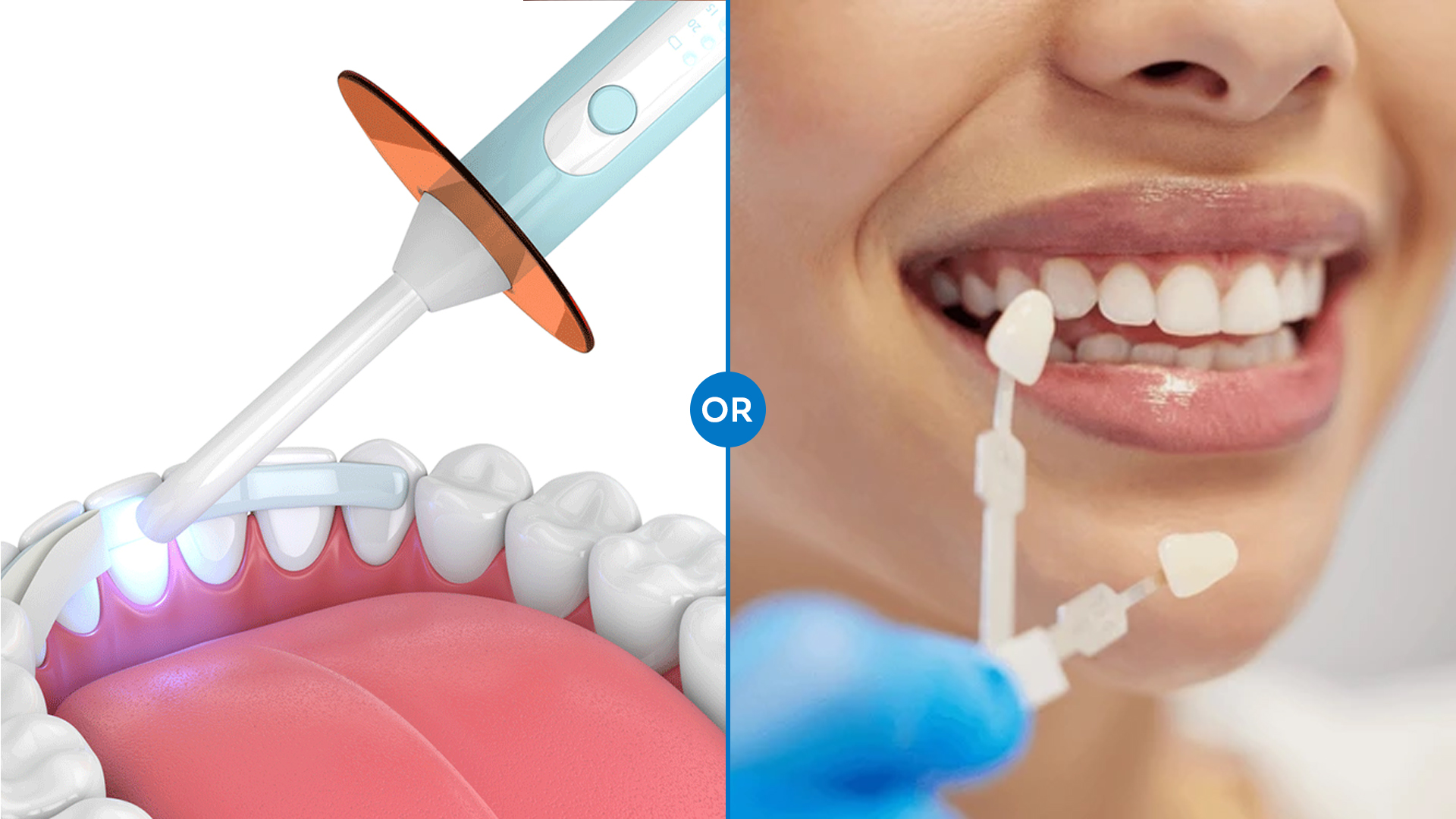Are you dreaming of a flawless smile but unsure whether to choose teeth bonding or veneers? You’re not alone! With so many cosmetic dental options available, it’s easy to feel overwhelmed. Both teeth bonding and veneers can enhance your smile, but they have distinct differences. In this guide, we will break down everything you need to know to help you make the best choice for your pearly whites.
What is Teeth Bonding?
Teeth bonding is a widely used cosmetic dental procedure that involves applying a tooth-colored resin to repair or enhance the appearance of your teeth. You can think of it as a quick solution for chips, cracks, or discoloration, similar to how you would use spackle to patch up a wall, but for your smile!
How Does Teeth Bonding Work?
The process is straightforward. Your dentist applies a soft, putty-like resin to your tooth, shapes it perfectly, and then hardens it with a special light. The result is a natural-looking tooth that blends seamlessly with the others.
Common Uses for Teeth Bonding
- Repairing chipped or cracked teeth
- Closing small gaps between teeth
- Covering discoloration or stains
- Making teeth look longer or more even
What are Veneers?
Veneers are thin, custom-made shells typically crafted from porcelain or composite resin that cover the front surface of your teeth. Think of them as tiny masks for your teeth, providing you with a Hollywood-worthy smile.
Types of Veneers
- Porcelain Veneers: Durable, stain-resistant, and natural-looking.
- Composite Veneers: More affordable, but less durable than porcelain.
How Are Veneers Applied?
Getting veneers is a more involved process than bonding. Your dentist will first remove a small amount of enamel from your tooth. Then, they will take an impression and bond the custom-made veneer to your tooth. It’s similar to fitting a tailored suit; precision is essential!
Comparing Teeth Bonding and Veneers
Let’s compare these two treatments directly and see how they measure up against each other.
Aesthetic Results
- Bonding: Great for minor fixes and subtle changes.
- Veneers: Ideal for dramatic transformations and a uniform, dazzling smile.
Durability and Longevity
- Bonding: Lasts 3-7 years on average.
- Veneers: Can last 10-15 years or more with proper care.
Cost Comparison
- Bonding: Typically $100-$600 per tooth.
- Veneers: Range from $800-$2,500 per tooth.
Time Commitment
- Bonding: Usually completed in one visit.
- Veneers: Requires at least two visits (consultation and placement).
Advantages and Disadvantages of Teeth Bonding
Advantages of Teeth Bonding
- Quick and painless
- Affordable
- Minimal tooth alteration
- Easily repairable
Disadvantages of Teeth Bonding
- Less durable than veneers
- Prone to staining
- May chip or break more easily
Advantages and Disadvantages of Veneers
Advantages of Veneers
- Long-lasting and durable
- Highly resistant to stains
- Natural, lifelike appearance
- Can correct multiple cosmetic issues at once
Disadvantages of Veneers
- More expensive
- Irreversible (enamel removal required)
- May cause tooth sensitivity
- Repairs can be more complex
Who is a Good Candidate for Teeth Bonding?
Bonding is ideal for addressing minor cosmetic issues such as small chips, cracks, or gaps. If you’re looking for a quick, affordable solution and your teeth are otherwise healthy, bonding might be your best option.
Who is a Good Candidate for Veneers?
Veneers are perfect for achieving a complete smile makeover. They are especially beneficial for individuals with multiple cosmetic issues, such as severe discoloration, uneven teeth, or worn enamel. However, it’s essential to have healthy gums and sufficient enamel for the procedure.
Maintenance and Aftercare
Caring for Bonded Teeth
- Avoid biting hard objects (like ice or pens)
- Brush and floss daily
- Limit foods and drinks that stain (coffee, red wine)
- Visit your dentist regularly
Caring for Veneers
- Practice good oral hygiene
- Use a non-abrasive toothpaste
- Avoid grinding your teeth
- Schedule regular dental check-ups
Potential Risks and Side Effects
Both procedures are generally safe, but there are some risks:
- Tooth sensitivity (especially with veneers)
- Chipping or cracking
- Discoloration over time (mainly with bonding)
- Gum irritation
How to Decide: Key Factors to Consider
Your Budget
If cost is a significant concern, bonding is typically the more affordable option.
Your Dental Health
Healthy teeth and gums are essential for both procedures. If you have significant decay or gum disease, you must address these issues first.
Your Cosmetic Goals
Are you looking for a subtle tweak or a complete transformation? Bonding is ideal for minor fixes, while veneers provide a dramatic change.
Consulting with Your Dentist
No two smiles are identical! Your dentist can evaluate your teeth, discuss your goals, and recommend the best options for you. Don’t hesitate to ask questions and share your concerns.
Real-Life Experiences: What Patients Say
Many patients appreciate the immediate results of bonding, particularly for minor repairs. Others enjoy the confidence boost that comes from veneers and their enduring beauty. Reading reviews and testimonials can help set realistic expectations.
Alternatives to Bonding and Veneers
Not sure if either option is right for you? Consider these alternatives:
- Teeth whitening for stains
- Orthodontics for alignment issues
- Dental crowns for severely damaged teeth
Conclusion
Deciding between teeth bonding and veneers can be straightforward. Both treatments can enhance your smile, but the best choice depends on your individual needs, budget, and goals. Take the time to explore both options, consult with your dentist at Premiere Dental, and remember that your perfect smile is within reach!
FAQs
1. Is teeth bonding painful?
Nope! Teeth bonding is usually painless and doesn’t require anesthesia unless you’re filling a cavity.
2. How long do veneers last?
With proper care, porcelain veneers can last 10-15 years or even longer.
3. Can I whiten bonded teeth or veneers?
Unfortunately, whitening treatments don’t work on bonding or veneers. If you want a whiter smile, discuss your options with your dentist before treatment.
4. Will my teeth be sensitive after getting veneers?
Some people experience mild sensitivity after veneers, but it usually fades within a few days.
5. Can teeth bonding or veneers fix crooked teeth?
They can improve the appearance of slightly crooked teeth, but severe misalignment may require orthodontic treatment.


